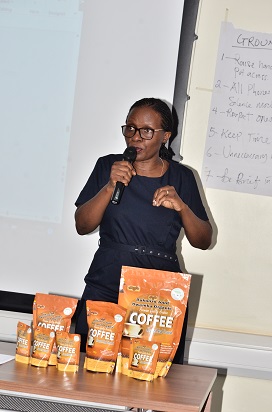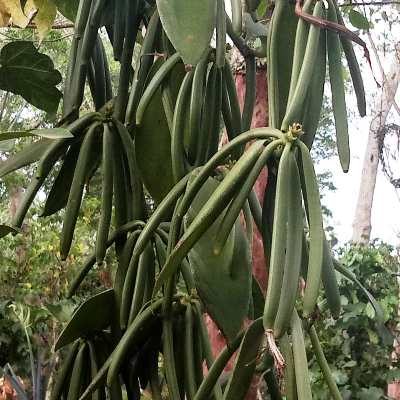The Agribusiness Development Centre Executive Director, Josephine Mukumbya speaks during the training.
100 coffee traders from 66 organisations, most of whom are involved in local coffee trading, have completed a beginner’s free three-day price risk management training by the Agribusiness Development Centre (ADC) at dfcu Bank Training Centre in Namanve Industrial Park, Mukono District.
The Agribusiness Development Centre builds the capacity of agribusinesses through trainings to become resilient. The training supported by GOPA world wide consultants and founding partners of ADC is aimed at equipping traders with information on how the coffee market works and how the international trends influence local trading.
Roland Sekajja said: “The intention of this training is to help you and make better and profitable decisions and earn more value from your coffee.”
Participants are taken through theories financial literacy, governance and agricultural products marketing to make farmer-based organisations self-sufficient by also linking them to financing. The training equips them with skills develop commercial strategies and make them more sustainable from the local trading environment to the international trading space.

Sekajja explained that apart from high value crops such as coffee and cocoa facing the risk of thieves, many losses are made because traders are not aware about how the market operates.
According to Wilberforce Kayonga, the Business Advisor and lead specialist in Price Risk Management training, the beginners class is just an eye opener for the traders to realise the big opportunities that exists in the coffee value chain.
Kayonga pointed out the fact that most traders are not aware of the fact that coffee prices are determined internationally and local traders simply follow suit.
“You should be able to monitor international trends and how the major producers especially Brazil, Vietnam and Colombia are working,” he said.
The future price of Robusta coffee is fixed in New York while that of Arabica is fixed in London. But these are mostly based on speculation among coffee producing companies and consumption trends.
“Futures markets are very volatile. As traders, you must be able to study the market trends carefully,” Kayonga added.

Coffee profiling and assured quality are key aspects in premium coffee markets.
Kayonga wants the local traders to enter into the available international markets, which are dominated by multinationals, to be able to earn a premium on their coffee.
He pointed to the farmers the need to seek niche markets by focusing on consumer needs.
The main niche coffee markets in the world are guaranteed by internationally-recognised certification that includes; Fairtrade, certified organic and Rainforest Alliance.
“When you understand how these markets work, the market share, the barriers and the impact of getting there, farmers develop tools that can enable them run more profitable enterprises. Whatever they do can translate in the international space,” Kayonga explained.
The training, which have been held since 2017, has benefited local exporting organisations by narrowing the information gap. This has not only helped these organisations grow but also decrease coffee farmers’ exploitation.
A key element is teaching them how to make contracts and negotiate better prices while monitoring the fluctuations to at least monitor price and the volatility of the international market.
Kayonga cautioned the coffee traders against carrying out transactions and agreements informally. Many traders find it more convenient to work that way as they think it reduces costs, time and resources. But the risks associated with conducting business in that manner without proper contracts is deemed very costly.
After the beginners training, the traders can join an online certification learning platform, SOMA, where they can learn more while ADC staff makes follow-up activities with the trainees.
Those who are resilient enough graduate to the next level of training where the can access finance and gain access to markets.
Since local consumption is low, the option is to find a place in the international markets.
The participants are identified from the regions depending on their capacity gaps.
Benard Olar from Okoro Coffee Union said he was impressed with the training because it uncovered trading information he had not previously given attention to.
“There is a big information gap in the coffee market. We need to devise mechanisms to be able to benefit from the export coffee market,” he said.





